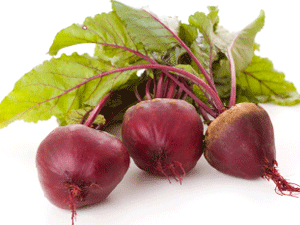夢裏不知身是客
凡事包容.凡事相信.凡事盼望.凡事忍耐。愛是永不止息.朋友愛吃紅菜頭,每天用紅菜頭、番茄、蘋果等多種蔬果攪拌成糊,「吃」一杯。那杯糊,顏色嚇人,形態曖昧,吃的時候不小心,就會雙唇染「血」。因為這樣,我對紅菜頭一直敬而遠之。
近來在有機菜檔常常見到紅菜頭,買了幾個回家,準備送給朋友。紅菜頭堆在我家廚房地下,在送出去之前,每天進進出出都得跟它照面,混了個臉熟之後,上網查找資料,這一看,不得了!原來紅菜頭素有歐洲靈芝之美譽,被某些國家的人視作補品。紅菜頭富含礦物質、葉酸,護肝、補血、控制血壓、保護心臟,益處多多。
紅菜頭的烹製方法繁多,當然最好是生吃,營養成份最完整。朋友的「紅菜頭泥」令我卻步,但用紅菜頭配合其他蔬果榨汁,深玫瑰紫的色澤相當誘人,味道也清甜宜人。
紅菜頭略煮,雪凍後可用作沙律。切片炒,味道與蘿蔔相近,但更甜一些。我還喜歡用它來煲湯。紅菜頭的葉,營養成份比紅菜頭更高,煲湯時把菜葉也放進去,配合大量蔬菜或根莖類食物,比如佛手瓜、粟米、胡蘿蔔等,加兩粒蜜棗,再用一點點肉吊出鮮味,極甜美。紅菜頭還可以用來浸醋,有排毒、防癌、抗氧化作用。
用一點點錢可以吃得健康又美味,何樂而不為呢?
從網上找到幾味紅菜頭 recipes ,收藏了備用。
蕃茄紅菜頭甘筍糊
蕃茄兩個切角、紅菜頭和甘筍各半個切段,水2杯。
用過濾水煮紅菜頭和甘筍,水滾後轉慢火煮10分鐘,取出,連同蕃茄一起放入攪拌機打成糊狀後,再倒回剛才用來煮紅菜頭和甘筍的湯裡,中火煮至滾即成。
紅菜頭排毒美顏水
紅菜頭(Beet)含豐富的鉀、磷、鈣、鎂、碘、鐵等礦物質和多種不同的胡羅卜素。它獨有的甜菜鹼,有助保持肝臟機能健康,具抗癌功效及清肝補血,還有多吃紅菜頭,有助提升體內的氧氣量。
紅菜頭葉含葉酸、維他命C、鉀和鐵,男女老幼都適宜食用,尤其對女性功效更佳。
紅菜頭連葉2個(約600克),過濾水1.5公升。 把紅菜頭連葉洗淨,紅菜頭切片,水滾後把材料放進,煲25分鐘就可以熄火飲用,可以連渣一同吃,既可飽肚又吃到纖維。
丁方紅菜頭香飯
材料: 紅菜頭1個(350克)、糙香米1杯、過濾水1杯
紅菜頭批皮切丁方,連同糙米及過濾水,放進電飯煲同煮。色香味俱全。
紅菜頭紅腰豆湯 - 貧血調理
功效:有健脾益氣,補血,强骨等功效。紅菜頭很補血,它含有錳,可與鐵合成肝臟和紅血球的所需養分。它還含有鐵、鈣、鉀、磷等多種礦物質及維生素,能令骨骼强健,紅菜頭配補血功效佳的紅腰豆、番茄、紅蘿蔔、薯仔煲素菜湯,對貧血、精神不振、骨質疏鬆人士很有益處。
材料:紅菜頭1~2個,紅蘿蔔1個,番茄2個,薯仔1個,紅腰豆2兩,陳皮1塊
做法:各種材料去皮,切塊,紅腰豆、陳皮浸軟;將全部材料放入煲內,用8碗水煮約2小時成4碗即成,飲湯吃湯料。
小貼士:但凡用豆類煲湯,可以加塊陳皮以化氣。此湯清甜好味,常飲此湯能令面色紅潤,骨骼强健,更有助預防冠心病。






Beetroot has been getting a lot of coverage in the news. It has been linked with better stamina, improved blood flood and lower blood pressure.
Beetroot became popular in Roman times and it was used to treat fever, constipation, wounds, skin problems - and was used as an aphrodisiac.
Researchers have known for some time that juice may help lower blood pressure, but in 2010 UK researchers revealed that nitrate is the special ingredient in beetroot which lowers blood pressure and may help to fight heart disease.
Beetroot is an excellent source of folate and a good source of manganese,[6] and contains betaines which may function to reduce the concentration of homocysteine,[7] a homolog of the naturally occurring amino acid cysteine. High circulating levels of homocysteine may be harmful to blood vessels and thus contribute to the development of heart disease, stroke, or peripheral vascular disease.[8] This hypothesis is controversial as it has not been established yet whether homocysteine itself is harmful, or whether it is just an indicator of increased risk for heart disease.[9]
The red colour compound betanin is not broken down in the body, and in higher concentration may temporarily cause urine and stool to assume a reddish colour; in the case of urine this is called beeturia.[10] This effect may cause distress and concern due to the visual similarity to hematuria (blood in the urine) or blood in the stool, but is completely harmless and will subside once the food is out of the system.